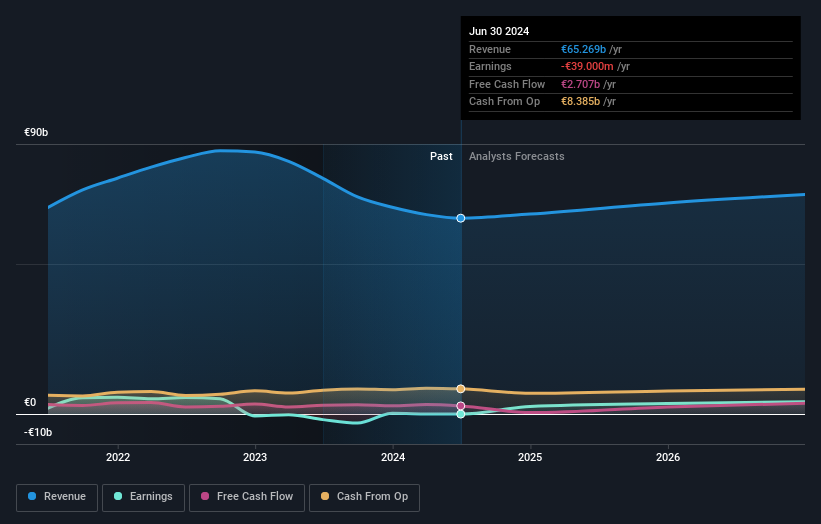BASF SE Just Missed EPS By 13%: Here's What Analysts Think Will Happen Next

Last week, you might have seen that BASF SE (ETR:BAS) released its half-yearly result to the market. The early response was not positive, with shares down 4.4% to €42.77 in the past week. Revenues were in line with forecasts, at €34b, although statutory earnings per share came in 13% below what the analysts expected, at €2.01 per share. The analysts typically update their forecasts at each earnings report, and we can judge from their estimates whether their view of the company has changed or if there are any new concerns to be aware of. We've gathered the most recent statutory forecasts to see whether the analysts have changed their earnings models, following these results.
Check out our latest analysis for BASF

Taking into account the latest results, the current consensus from BASF's 18 analysts is for revenues of €66.6b in 2024. This would reflect an okay 2.1% increase on its revenue over the past 12 months. BASF is also expected to turn profitable, with statutory earnings of €2.78 per share. Yet prior to the latest earnings, the analysts had been anticipated revenues of €67.9b and earnings per share (EPS) of €2.93 in 2024. So it looks like there's been a small decline in overall sentiment after the recent results - there's been no major change to revenue estimates, but the analysts did make a small dip in their earnings per share forecasts.
It might be a surprise to learn that the consensus price target was broadly unchanged at €53.84, with the analysts clearly implying that the forecast decline in earnings is not expected to have much of an impact on valuation. The consensus price target is just an average of individual analyst targets, so - it could be handy to see how wide the range of underlying estimates is. There are some variant perceptions on BASF, with the most bullish analyst valuing it at €70.00 and the most bearish at €42.00 per share. There are definitely some different views on the stock, but the range of estimates is not wide enough as to imply that the situation is unforecastable, in our view.
Looking at the bigger picture now, one of the ways we can make sense of these forecasts is to see how they measure up against both past performance and industry growth estimates. We would highlight that BASF's revenue growth is expected to slow, with the forecast 4.2% annualised growth rate until the end of 2024 being well below the historical 5.8% p.a. growth over the last five years. Compare this to the 18 other companies in this industry with analyst coverage, which are forecast to grow their revenue at 4.7% per year. Factoring in the forecast slowdown in growth, it looks like BASF is forecast to grow at about the same rate as the wider industry.
The Bottom Line
The most important thing to take away is that the analysts downgraded their earnings per share estimates, showing that there has been a clear decline in sentiment following these results. They also reconfirmed their revenue estimates, with the company predicted to grow at about the same rate as the wider industry. There was no real change to the consensus price target, suggesting that the intrinsic value of the business has not undergone any major changes with the latest estimates.
With that said, the long-term trajectory of the company's earnings is a lot more important than next year. At Simply Wall St, we have a full range of analyst estimates for BASF going out to 2026, and you can see them free on our platform here..
You should always think about risks though. Case in point, we've spotted 2 warning signs for BASF you should be aware of, and 1 of them is concerning.
Valuation is complex, but we're here to simplify it.
Discover if BASF might be undervalued or overvalued with our detailed analysis, featuring fair value estimates, potential risks, dividends, insider trades, and its financial condition.
Access Free AnalysisHave feedback on this article? Concerned about the content? Get in touch with us directly. Alternatively, email editorial-team (at) simplywallst.com.
This article by Simply Wall St is general in nature. We provide commentary based on historical data and analyst forecasts only using an unbiased methodology and our articles are not intended to be financial advice. It does not constitute a recommendation to buy or sell any stock, and does not take account of your objectives, or your financial situation. We aim to bring you long-term focused analysis driven by fundamental data. Note that our analysis may not factor in the latest price-sensitive company announcements or qualitative material. Simply Wall St has no position in any stocks mentioned.
Have feedback on this article? Concerned about the content? Get in touch with us directly. Alternatively, email editorial-team@simplywallst.com
About XTRA:BAS
Adequate balance sheet with moderate growth potential.
Similar Companies
Market Insights
Community Narratives



